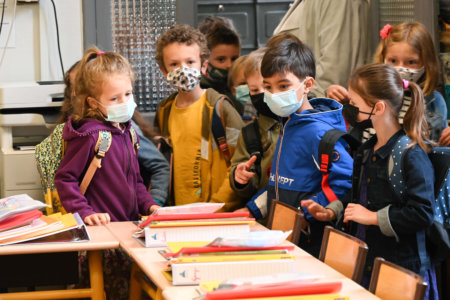
Do you struggle with focusing in class?
Do you find it hard to sit still – constantly jiggling your feet and shifting your head around, eyes wandering the room?
Maybe for a large part of your life, your parents, teachers, and peers may have called you lazy, slow, or stupid – maybe all three.
If the answer’s “yes,” you might have attention-deficit hyperactivity disorder, otherwise known as ADHD.

Why not stop for a moment to check your phone during a snowstorm? Source: AFP
What is ADHD?
ADHD is a common neurodevelopmental disorder affecting people’s behaviour. It is characterised by a person having difficulties with inattentiveness, hyperactive-impulsiveness, or both. An estimated 366 million adults worldwide are currently living with ADHD, which is roughly the population of the US.
While the exact cause remains unknown, researchers have identified that the condition tends to run in families.
Beyond that, ADHD can occur in people of any intellectual ability, although it’s more common in people with learning difficulties — more commonly referred to as a spectrum condition. According to the National Institute of Mental Health, every person will experience different symptoms and face different challenges – hence the phrase “being on the spectrum.”
Whilst ADHD is usually diagnosed in childhood, there is also an increasing number of people who are being diagnosed for the first time in adulthood. This is because ADHD is now better recognised and diagnosed as compared to older times.
Regrettably, there’s no cure. ADHD can be managed with appropriate educational support, advice, and support, alongside medication, if necessary. But there is no surefire way to completely get rid of this condition.
So, how exactly can you identify ADHD, especially in places like the classroom where attention is required the most? Let’s take a look.

Students with ADHD will have trouble focusing in class and even more trouble focusing on important things like their exams. Source: AFP
ADHD in the wider setting
ADHD is one of the most commonly diagnosed mental disorders in children. It is frequently detected during the early school years when a child begins to have problems paying attention.
A student with ADHD can fall into two categories:
- Being inattentive, which means getting distracted, being forgetful or generally unable to focus in class.
- Showing hyperactive and impulsive symptoms, such as being unable to sit still, running around, or blurting and shouting out things.
There’s also a third category — a combination of being inattentive and having hyperactive-impulsive tendencies. This combination is the most common type of ADHD, while being solely hyperactive-impulsive is the least common type.
As a result, children and teenagers with ADHD often suffer from low grades, punishment, teasing and bullying from their peers, and battle with low self-esteem.
When they enter the professional world, their ADHD may affect their job performance in many ways – they may struggle to sit and focus during an important meeting or have difficulty keeping track of multiple projects. In extreme cases, even the noise and movement of an office environment can make it even harder to focus.
Of course, there may be other mental health concerns that may seem like ADHD at first, but are actually something else. A person who is unable to focus in class or at work may be distracted by anxiety or suffering from insomnia. Another person with dyslexia may act out because they’re frustrated with schoolwork or family issues.
This is why it’s important to seek out a professional to get a proper diagnosis, regardless of what mental condition or disorder you think you may have. You shouldn’t attempt to self-diagnose either, as it will lead to dangerous outcomes.

On its own, self-diagnosis doesn’t pose much harm — it’s what you do with the information that matters. Source: AFP
The dangers of self-diagnosing
Self-diagnosing is a worrying trend.
Many are using the Internet – or, even worse, TikTok – to self-diagnose, putting labels on themselves and even others. Some people even start using their self-diagnosis to make excuses for their behaviour or to avoid responsibility.
The reason? Diagnosis-related medical content on social media has become more widespread over the past few years, especially on platforms such as TikTok, Instagram, and X. Social media feeds are filled with stories of sickness, symptoms, and content revolving around identifying illnesses or mental disorders.
While medical professionals create some of this content, much of it is posted by content creators, influencers, and other non-medical professionals. The content is so relatable and convincing that some people have begun using social media to self-diagnose.
Admittedly, it has helped educate many people on conditions or illnesses they might have. It’s a convenient way to learn, but ultimately isn’t always safe, especially if you don’t follow up with a proper doctor or specialist.
One out of four people self-diagnose, and adults aged 18 to 29 use health apps to self-diagnose more than any other adult age group. It’s often inaccurate and can even contribute to further problems with both physical and mental health, such as misdiagnosis.
The most commonly diagnosed mental disorder is depression, but it’s commonly self-diagnosed, along with the following disorders:
- Bipolar disorder
- Schizophrenia
- Anxiety disorders
- ADHD
However, mental disorders come in many different sub-categories that all require their own particular method of diagnosis and treatment.
For example, people who suffer from mood swings may think they have bipolar disorder, but mood swings can be indicative of many different issues, including stress, hormonal imbalances, a personality disorder, or another neurological problem.
A misdiagnosis that stems from a self-diagnosis can also pose more serious problems. People run the risk of trying medications or other therapies that can make their issues worse, like wasting precious time and money on treatments that do nothing for them.
The moral of the story: Never self-diagnose. Always seek out a professional if you have the means to, and receive a proper diagnosis so you can start seeking treatment. Alternatively, speak to someone who is properly diagnosed for some insight and tips, like Bryce Chee from Australia.

Chee graduated from RMIT University with a degree in business. Source: Bryce Chee
The best tips for ADHD, from a person diagnosed with ADHD
Originally from Singapore, Chee moved to Melbourne to pursue a business degree at RMIT University. After graduating with distinction, he decided to stay on as a permanent resident, enjoying what Australia had to offer.
For the most part of his life, Chee never understood why he was so forgetful or why he didn’t enjoy school at all. It was only when his work supervisor approached him and advised him to get checked for ADHD.
Since then, Chee has been officially diagnosed. While it hasn’t been easy managing his condition for the most part, he gradually learned to live with it. Here are three pieces of great advice from him.
Have a visible calendar at all times
Chee: When I’m working, my calendar always needs to be visible on my desktop. If I cover it with a different window or application, I will literally forget what tasks I need to do today.
I rely a lot on my calendar to be like my memory. With ADHD, it’s practically impossible for me to remember anything in the future, so I developed the habit of creating calendar events when something’s actually happening.
Admittedly, I cannot tell you the number of times I forgot to even make a calendar event for something. But over the years, it’s now muscle memory. Now, I make calendar events for everything — going out with friends, arranging dates with my wife, work-related tasks, and even blocking out time on weekends for my hobbies.
Use management applications to make life easier
Chee: I used to use Notion a lot to keep track of my personal stuff or work. I also used to use it to journal when I was struggling a lot in the beginning with my medication — in a way, it helped with my medicine tracking, as well as emotional regulation. I still use it here and there, but I use it less often these days.
Password managers are also very good. Honestly, I can’t even remember important things most of the time, so who has the time to remember passwords? I wouldn’t survive without them, and I recommend them to anyone, not just those with ADHD.
Personally, I use Bitwarden. In my opinion, it’s a bit better to get more obscure password managers as compared to LastPass since they will be less likely targets for cyberattacks.
Be kind to yourself
Chee: The life you’ve lived so far doesn’t determine who you will become in the future.
It doesn’t mean the crappy life you’ve had with ADHD, and all the truths you’ve learned about yourself so far, did not happen, but you have to believe in your ability to change for the better. Each person’s journey is different, but always be kind to yourself.
If you relate to any symptoms or feel like any signs resonate with you, I highly recommend looking it up on legit sources or talking to a friend about it first, then going to a doctor if you have strong suspicions.
Even if you don’t end up taking medication for ADHD, it’s good to just be more educated on the subject. It helps prevent yourself and others from running around and using ADHD as an excuse for your behaviour.










